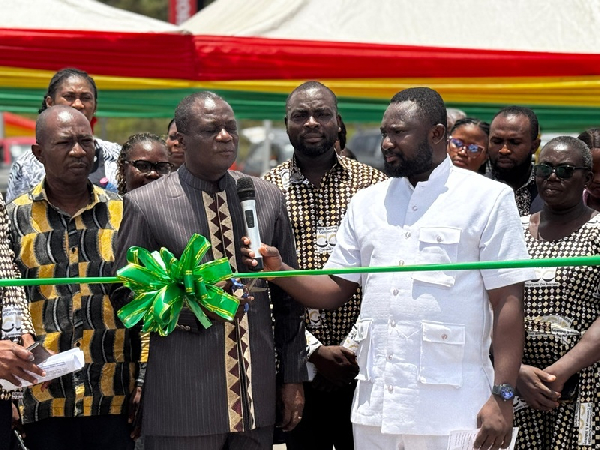The Western Regional Minister, Joseph Nelson, has acknowledged the vital role small businesses play in growing the country’s economy.
Consequently, he made a passionate appeal to Ghanaians to patronize made-in-Ghana products in local markets in order to empower and support the growth of indigenous businesses.
He emphasized that Ghanaians must make a conscious effort to buy locally made products to strengthen the country’s economy.
“Buy from them. Mentor them. Partner with them. Let us empower our entrepreneurs so they can stand shoulder-to-shoulder with their global counterparts,” the Minister remarked.
“Together, we can build an inclusive, resilient, and globally competitive economy—powered by our Small and Medium-scale Enterprises (SMEs).”
He made these comments while speaking at the 4th edition of the Chamber Bazaar 2025, a trade exhibition organized by the Ghana National Chamber of Commerce and Industry (GNCCI) in the Western Region to showcase locally made Ghanaian products by Ghanaian companies.
He described the trade fair as not only inspiring but also heartwarming and refreshing.
Under the theme “Empowering and Preparing SMEs for Global Markets,” the Minister underscored the importance of positioning businesses in this era of cross-border trade aided by technology.
“It has become even more relevant for businesses to better position themselves and take advantage of global markets. It is only through international commerce—guided by principles of fair trade and mutual interest—that businesses can grow and explore their full potential.”
He added, “Let me seize this opportunity to express my gratitude to the regional manager and the Chairman for their invitation. I commend and congratulate them for this initiative and their remarkable enthusiasm in organizing such a successful bazaar. Our national president is here with us—Mr. Stephane Miezan, you are warmly welcome.”
The Minister continued, “Not too long ago, the leadership of the Chamber engaged me in my office to congratulate me. And today, here we are again for another engagement. Let me assure the business community in the Western Region that, together with the Chamber of Commerce, we will work to promote business development in the region. We have the potential to make a real difference—thanks to our strategic location and abundant natural resources.”
Joseph Nelson noted that the activities of small businesses should serve as motivation for others to do more.
“We must encourage increased investment in the region and explore partnerships both locally and internationally to support business growth. Without a doubt, Small and Medium Enterprises (SMEs) remain the backbone of our economy—creating employment, driving innovation, and contributing significantly to Ghana’s GDP.”
He further highlighted the role of SMEs in the Western Region, stating: “SMEs form the lifeblood of our local economies—from agro-processing, arts and crafts, to retail, manufacturing, and service delivery.
They embody the creativity, resilience, and entrepreneurial spirit of our people. However, we must also admit that SMEs face a number of challenges, particularly when it comes to accessing global markets.”
These challenges include, but are not limited to:
• Limited access to finance and modern equipment
• Inadequate capacity and limited knowledge of international trade practices
• Difficulties in meeting international standards and regulations
• Insufficient data on emerging global market trends
To address these issues, the Minister proposed a multi-faceted strategy that is both forward-looking and inclusive.
“Firstly, access to finance remains crucial,” he noted.
He added, “The NDC government, through its 2024 People’s Manifesto, has committed to establishing a Ghana SME Fund—a dedicated financing mechanism to support SMEs with low-interest loans, grants, and equity funding. Additionally, tax incentives and access to venture capital will be enhanced to ease the financial burden on entrepreneurs.”
“Secondly, the government will invest in capacity building through regional enterprise support hubs that will provide technical support, digital skills, and mentorship opportunities. These will ensure that our SMEs are not only efficient but globally competitive.”
“Thirdly, we must help our businesses meet international standards. The government will work closely with regulatory agencies such as the Ghana Standards Authority and the Food and Drugs Authority to streamline compliance processes and provide advisory services to SMEs.”
“Fourthly, the digital economy presents SMEs with unprecedented opportunities. We will expand digital infrastructure and training programs to ensure our SMEs can leverage e-commerce platforms, digital payment systems, and virtual trade expos to reach markets beyond our borders.”
The Minister emphasized that empowering and preparing SMEs for the global market also means encouraging partnerships.
“We need to connect our local entrepreneurs with international counterparts, donor agencies, and trade facilitators who can open doors to global supply chains.”
He assured that the region is committed to creating a business-friendly environment through policies that reduce bureaucracy, provide market access, and promote innovation.
“The Western Region has a strategic advantage—its proximity to ports, abundant resources, and industrious population—which we must fully leverage,” he stated.
In conclusion, he said, “I want to commend the Western Regional Chapter of the Ghana National Chamber of Commerce and Industry (GNCCI) for this initiative, and I urge all stakeholders—government, development partners, financial institutions, and individuals—to rally behind our SMEs.”
